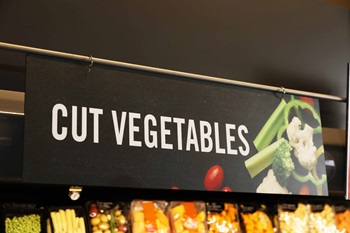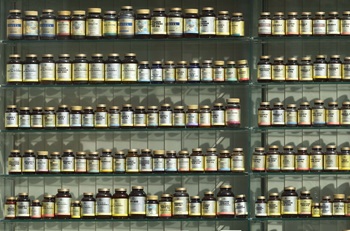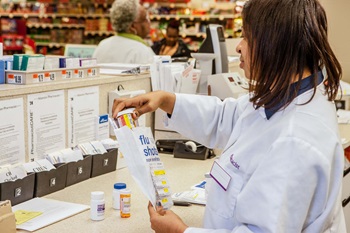-
Industry Topics
- Asset Protection
- Biotechnology
- Corporate Social Responsibility
- Crisis Management
- Diversity, Equity & Inclusion
- Food Assistance Programs
- Food Price Inflation
- Fresh Foods
- Frozen Foods
- Health & Well-being
- Independent Operator
- Labeling
- Labor & Employment
- Nonfoods
- Omnichannel
- Payments
- Pharmacy
- Private Brands
- Supplier Diversity
- Supply Chain
- Technology
- Total Store Collaboration
- Wholesaler
- Workforce & Talent
- Research & Insights
- Events & Education
- Food Safety
- Government Affairs
- Get Involved
Bioengineering Talking Points by Department
Food retail employees must be prepared to answer consumer questions related to bioengineering and biotechnology. The departmental talking points below offer insights specific to categories of products. In that way employees can answer questions and help shoppers find products they are looking for. Use the quick links on the left to jump to a department.
Produce Department
 Few fresh fruits and vegetables are bioengineered. However, those that are bioengineered have been evaluated by USDA, FDA and EPA and found to be safe for people and animals as well as the environment.
Few fresh fruits and vegetables are bioengineered. However, those that are bioengineered have been evaluated by USDA, FDA and EPA and found to be safe for people and animals as well as the environment.- New varieties of fruits and vegetables are often produced through traditional cross breeding, including novel products such as cotton candy grapes that many people mistakenly assume are bioengineered.
- The products that might be bioengineered include sweet corn, papaya from Hawaii and summer squash/zucchini. Overall, these contribute a small proportion of produce sold over the year. They most often involve additional traits that either fight disease viruses (summer squash, papaya) or dramatically reduce pesticide applications (sweet corn) and will soon carry the “Bioengineered” label. Note that edamame (fresh soybeans) are a different variety than field soybeans and have not been bioengineered.
- Biotechnology helps assure that hydroponic vegetables such as lettuce, peppers and tomatoes, obtain nutrition without using soil, synthetic fertilizers or pesticides. It’s possible for hydroponics to be certified organic.
- Emerging approved bioengineered products include Arctic Apples (non-browning) and pink pineapple. Several gene edited products are being developed including non-browning mushrooms, low acrylamide potatoes (to reduce cancer risk) and virus resistant oranges (to control the devastation of citrus greening).
- An easy way to avoid bioengineered fruits and vegetables is to choose either the certified organic or non-GMO label. However, be aware that these may be no different than produce that is not labeled. That is, since no bioengineered blueberries exist, all blueberries are non-GMO, whether they have a label or not.
Meat Department
 No bioengineered meat or poultry products are currently available. A faster growing bioengineered salmon has been approved but is not yet in commercial production
No bioengineered meat or poultry products are currently available. A faster growing bioengineered salmon has been approved but is not yet in commercial production- Livestock feed is commonly from bioengineered corn, soybean and alfalfa crops. There is no evidence that this changes the meat in any way. Both certified organic and non-GMO labeled products are from livestock that have not been fed bioengineered feed.
- Certified organic and non-GMO crops are more labor-intensive and often have lower yields so that farmers must charge a premium. Depending on how much feed is consumed (more for beef, less for poultry) this can dramatically impact the cost of non-GMO and certified organic products compared to meats from conventionally raised animals.
Bakery Department
 In coming years bakery items will be labeled as Bioengineered if they contain at least one ingredient that has measurable DNA from another species.
In coming years bakery items will be labeled as Bioengineered if they contain at least one ingredient that has measurable DNA from another species.- Many ingredients used in making breads and baked desserts start out as bioengineered crops. Examples include oils, starches, sugar, proteins, fiber and a variety of additives made from sugar beets, soybeans, corn and canola. These are often so highly refined than no measurable DNA is present.
- Milk-derived ingredients could be from cattle treated with a bioengineered hormone (rBST) or fed bioengineered grain. Eggs are likely from chickens that were fed bioengineered grain. There is no evidence that this makes the ingredients any less safe.
- Wheat has been improved through traditional cross breeding over the last few hundred years. Although bioengineered wheat was tested it is not now in commercial production. Nuts, seeds and other grains like oats, rye and barley have not been bioengineered.
- Some important bakery additives such as yeast and enzymes can be produced through bioengineering and may contain measurable DNA.
- Neither certified organic nor non-GMO labeled products allow ingredients that were somehow derived from bioengineering. Even bee hives must meet criteria and be a specified distance from bioengineered crops in order for the honey to be labeled either non-GMO or certified organic.
- Non-GMO should not be mistaken for gluten free. Gluten is a protein found in wheat, rye and barley that has nothing to do with bioengineered status. Consuming non-GMO or certified organic wheat would be dangerous for anyone with gluten intolerance.
Dairy Department
 Dairy cattle and egg laying hens are typically fed bioengineered crops like corn, soybeans and alfalfa. There is no evidence that this affects the safety of the milk, eggs or other products, like yogurt, cheese and cream, made from them.
Dairy cattle and egg laying hens are typically fed bioengineered crops like corn, soybeans and alfalfa. There is no evidence that this affects the safety of the milk, eggs or other products, like yogurt, cheese and cream, made from them.- Some dairy products, such as sweetened milk and yogurt, may include sugar derived from bioengineered sugar beets. Bioengineered canola or soy may be blended with butter in a spread. A fraction of dairy production is from cattle treated with a bioengineered hormone (rBST) to enhance milk production. These products would probably not carry a “Bioengineered” label since there would likely be no DNA present. However, companies could voluntarily state that the products are “Derived from Bioengineering”.
- Most cheese made in this country uses bioengineered enzymes to help milk coagulate. If DNA from another species is measurable in the enzymes, then the cheese will need to be labeled as “Bioengineered.”
- Certified Organic and non-GMO dairy products and eggs are produced from cows and chickens that are not given bioengineered feed. Dairy cattle are not treated with rBST, nor is the cheese made with bioengineered enzymes. And ingredients like sugar, oils and additives cannot be derived from bioengineering.
- Organic and non-GMO soy milk and tofu are made from soybeans that are not bioengineered.
Center Aisles: Snacks, Crackers, Cereals, Canned Fruits and Vegetables, Frozen Fruits and Vegetables, etc.
 Many packaged foods contain ingredients from bioengineered crops such as field corn, soybeans, canola and sugar beets. These have been evaluated by the USDA, FDA and EPA and found to be safe for people as well as the environment.
Many packaged foods contain ingredients from bioengineered crops such as field corn, soybeans, canola and sugar beets. These have been evaluated by the USDA, FDA and EPA and found to be safe for people as well as the environment.- Products will soon need to be labeled as “Bioengineered” if at least one ingredient has measurable DNA from another species. However, many ingredients, such as sugar, corn syrup, soybean and canola oil are so highly refined that there is no measurable DNA. Similarly, food additives are often produced through bioengineering but contain no DNA. In such cases, food companies may voluntarily state that the products are “Derived from Bioengineering.”
- If a customer is asking about a product that contains fruit, vegetables, meat, dairy or baked products it may be helpful to consult the previous tips for the Produce, Meat/Seafood, Dairy and Bakery departments to learn more.
- An easy way to avoid bioengineered packaged products is to look for either the certified organic or non-GMO claim. However, be aware that these may be no different than product that is not labeled. That is, since no bioengineered olives exist, all olive oil is non-GMO, whether the package says so or not.
Dietary Supplements
 Many supplements include sweeteners, oils, starches, proteins, fibers, enzymes, vitamins, emulsifiers, yeast and probiotics that are produced through bioengineering. In some cases these will have measurable DNA from another species and will need to be labeled as “bioengineered.” However most of these ingredients will be so highly refined that there is no measurable DNA. In that case, dietary supplement companies may voluntarily state that these products are “Derived from Bioengineering”
Many supplements include sweeteners, oils, starches, proteins, fibers, enzymes, vitamins, emulsifiers, yeast and probiotics that are produced through bioengineering. In some cases these will have measurable DNA from another species and will need to be labeled as “bioengineered.” However most of these ingredients will be so highly refined that there is no measurable DNA. In that case, dietary supplement companies may voluntarily state that these products are “Derived from Bioengineering”
Over the Counter and Prescription Drugs
 Many drugs used to treat or prevent illness have been produced through bioengineering. Human insulin, a highly successful example, is widely prescribed and replaces most other sources of insulin. Highly specialized treatments involving biotech drugs have created tremendous excitement for previously untreatable cancers. New gene edited therapies are addressing inherited diseases especially where a single trait can be adjusted.
Many drugs used to treat or prevent illness have been produced through bioengineering. Human insulin, a highly successful example, is widely prescribed and replaces most other sources of insulin. Highly specialized treatments involving biotech drugs have created tremendous excitement for previously untreatable cancers. New gene edited therapies are addressing inherited diseases especially where a single trait can be adjusted. - All drugs must meet strict FDA standards for purity and effectiveness. Don’t hesitate to ask your pharmacist about how any drug was produced and tested.
Mega Menu
 Industry Topics address your specific area of expertise with resources, reports, events and more.
Industry Topics address your specific area of expertise with resources, reports, events and more.
 Our Research covers consumer behavior and retail operation benchmarks so you can make informed business decisions.
Our Research covers consumer behavior and retail operation benchmarks so you can make informed business decisions.
 Events and Education including online and in-person help you advance your food retail career.
Events and Education including online and in-person help you advance your food retail career.
 Food Safety training, resources and guidance that help you create a company food safety culture.
Food Safety training, resources and guidance that help you create a company food safety culture.
 Government Affairs work — federal and state — on the latest food industry policy, regulatory and legislative issues.
Government Affairs work — federal and state — on the latest food industry policy, regulatory and legislative issues.
 Get Involved. From industry awards to newsletters and committees, these resources help you take advantage of your membership.
Get Involved. From industry awards to newsletters and committees, these resources help you take advantage of your membership.
 Best practices, guidance documents, infographics, signage and more for the food industry on the COVID-19 pandemic.
Best practices, guidance documents, infographics, signage and more for the food industry on the COVID-19 pandemic.
© FMI All rights reserved.
251 18th Street S, Suite 1200, Arlington, VA 22202 | phone: 202-452-8444 | fax: 202-429-4519
Website design by Matrix Group International, Inc. ®
-
fmi-icon-frozen-goods
-
fmi-icon-workforce
-
fmi-icon-certificate
-
fmi-icon-pharmacy
-
fmi-icon-food-safety
-
fmi-icon-asset-protection
-
fmi-icon-education force-icon-3
-
fmi-icon-research
-
fmi-icon-government-affairs
-
fmi-icon-get-involved
-
fmi-icon-industry-topic force-icon-3
-
fmi-icon-labeling
-
fmi-icon-corporate-social-responsibility
-
fmi-icon-payments
-
fmi-icon-crisis-management
-
fmi-icon-private-brands
-
fmi-icon-food-assistance
-
fmi-icon-supplier-diversity
-
fmi-icon-fresh-foods
-
fmi-icon-supply-chain
-
fmi-icon-general-merchandise
-
fmi-icon-technology
-
fmi-icon-health-wellness
-
fmi-icon-total-store-collaboration
-
fmi-icon-Health-Reform
-
fmi-icon-wage-labor
-
fmi-icon-independent-operator
-
fmi-icon-wholesaler-topic
-
fmi-icon-newsroom force-icon-3
-
fmi-icon-tax-reform
-
fmi-icon-about_icon force-icon-4
-
fmi-icon-about_icon
-
fmi-icon-cart
-
fmi-icon-blog_icon force-icon-5
-
fmi-icon-cart
-
fmi-icon-Communications
-
fmi-icon-omnichannel
-
fmi-icon-biotechnology-topic
